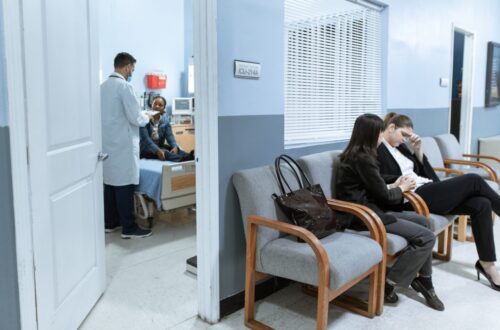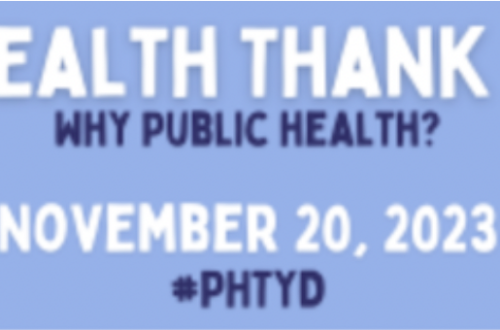
What Do Health Journalists Do?
We talk a lot about how healthcare professionals can help people learn how to advocate for their health and to optimize their care, but other professionals help people do that too: health journalists.
 Health journalism is an interesting beat and it’s a valuable one. It allows writers to dig deep into issues that affect people’s health and wellness and how they live. In addition, health journalists help educate and inform the public about health issues. They translate complex medical information into easily understandable content, allowing readers to be their own patient advocates and to advocate for others while making informed decisions about health-related matters.
Health journalism is an interesting beat and it’s a valuable one. It allows writers to dig deep into issues that affect people’s health and wellness and how they live. In addition, health journalists help educate and inform the public about health issues. They translate complex medical information into easily understandable content, allowing readers to be their own patient advocates and to advocate for others while making informed decisions about health-related matters.
Maureen Quinn Salamon, a long-time freelance health journalist based in New Jersey, said, “I like writing about health for both selfish and altruistic reasons. Ever since I was a kid, I’ve always been fascinated by the way the human body works and how things can go terribly wrong. Writing about health scratches a constant itch to learn more about this. But I also value the chance to help people make important choices about the way they live their lives and improve their health.”
Health journalists cover stories of public concern
Health journalists report on local, national, and international health issues. These include disease outbreaks, such as Ebola, influenza, or food poisoning outbreaks, as well as new drugs and treatments for common and not-so-common illnesses. Some health journalists specialize in policy, insurance, and the healthcare system itself. And yet others write about personal health stories, as well as individual patient experiences and the impact of diseases on families.
“Just recently, I was reminded that sometimes my work can truly make a difference in an individual’s life,” Salamon said. “A man I interviewed for a patient profile told me he had only been able to access the ground-breaking surgery he had because he stumbled over a prior article of mine about the same surgery. “I’m not overstating this—your article changed my life,” he said. I was humbled and grateful for the chance to witness how my work could help make someone’s life markedly better.”
But there’s more!
Health journalists are watchdogs. They watch and follow news from the pharmaceutical and healthcare industries, investigating reports of fraud, medical malpractice, and other unethical practices. Many health stories started as small ideas. A reporter or an editor hears about something that doesn’t make sense, and then they start digging around. Sometimes, there is no story. Sometimes, there is a big one. For example, how many people knew about the seriousness of concussions in sports before some journalists picked it up and started reporting on them? Or how about the series of articles at ProPublica that exposed how a supposedly life-saving device harmed patients instead of helping them?
practices. Many health stories started as small ideas. A reporter or an editor hears about something that doesn’t make sense, and then they start digging around. Sometimes, there is no story. Sometimes, there is a big one. For example, how many people knew about the seriousness of concussions in sports before some journalists picked it up and started reporting on them? Or how about the series of articles at ProPublica that exposed how a supposedly life-saving device harmed patients instead of helping them?
Writing about health and wellness impacts public health education and making policy. When health journalists report on health issues, they can help shape public opinion regarding policies and regulations that affect health and wellness. Their writing can also help educate those who make the policies, providing them with critical information regarding health and the healthcare system.
Ignore the sensationalism though
Of course, there’s a big difference between reporting on health issues correctly and looking for clicks. Sadly, there is much of the latter because the internet allows anyone to write about anything. So the trick is to be sure you understand who is writing the content, who is publishing it, and what the end goal is.
 Several years ago, a study came out about children and peanut allergies. Unfortunately, some reporters, writers, and bloggers misunderstood or misread the findings and started writing articles about how parents should give their babies peanut products early to avoid peanut allergies. But when I read the full study, I learned quickly that was NOT what the study authors said.
Several years ago, a study came out about children and peanut allergies. Unfortunately, some reporters, writers, and bloggers misunderstood or misread the findings and started writing articles about how parents should give their babies peanut products early to avoid peanut allergies. But when I read the full study, I learned quickly that was NOT what the study authors said.
Researchers looked at children at high risk of having a peanut allergy because they had an egg allergy and/or eczema. The important part here is that this was done under supervision. So I wrote an article titled, “What the Peanut Study Really Said.”
So how do you tell if a story is legitimate, click-bait, or fear-mongering? It can be tricky, but here are some tips:
- Sensationalism. Sensational stories get air time and lots of clicks. See what other outlets report if a story seems too good to be true. If it links to a study, go to the research and read at least the abstract to see if it matches what the articles said.
- Never and always. There is rarely never and always associated with new treatments. An article that promises you success is likely sensational.
- Sponsors. Look at the “about us” section to see who is hosting and sponsoring the site. Do they have something to sell?
- Author. Who wrote the piece? Do online searches show well-researched pieces or sensational, less-than-quality articles?
- Timing. How old is the article? Remarkable new findings aren’t so significant if they’re a decade old. The information may have been debunked between publication and now.
Trust but verify
As Karin Molander, co-founder of Decipher Your Health, often says, trust but verify. There is a lot of good health information out there. There are many trusted and excellent health journalists out there. So let’s support the work they do and let them teach us as we navigate our way through life and as we decipher our health.
Disclaimer
The information in this blog is provided as an information and educational resource only. It is not to be used or relied upon for diagnostic or treatment purposes.
The blog does not represent or guarantee that its information is applicable to a specific patient’s care or treatment. The educational content in this blog is not to be interpreted as medical advice from any of the authors or contributors. It is not to be used as a substitute for treatment or advice from a practicing physician or other healthcare professional.




